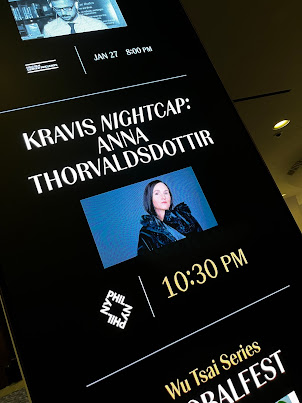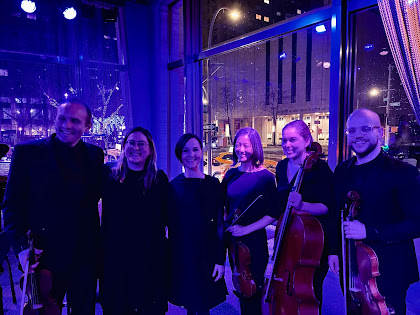 |
| We knew we were in the right place. |
Late in 2022, I had the distinct pleasure of hearing a spectacular concert by the Tak Ensemble, which included the world premiere of Tyshawn Sorey’s time-suspending elegy, For Jaimie Branch. Unusually - for a classical concert, anyway - the concert started at 10:30 PM. That’s because it was part of the New York Philharmonic’s Kravis Nightcap series, which has been reimagined for the 2022/23 season to include more collaborative freedom on the part of the curators, who are often involved with other activities going on at Lincoln Center.
When I was at the Tak show, I spotted Anna Thorvaldsdottir's name for the January 14th Nightcap, coinciding with the NY Phil's premiere of Catamorphosis, one of her latest orchestral works. After noting it on my calendar, I asked Patrick Castillo, composer and Vice President of Artistic Planning for the orchestra, what she had planned. "We don't know," he answered, and we both chuckled as the concert was less than a month a way. But we knew it would come together and all make sense in the end - and it did.
Now the night had come and, although a family event prevented us from hearing Catamorphosis, my daughter (and constant concert companion) and I arrived at David Geffen Hall early enough to experience the beautiful sight of New Yorkers casually scattered around the lobby listening to the Rite Of Spring beamed down from the hall upstairs and displayed on the enormous screens at the north end of the space. Not only did it sound good it felt like a step forward in Lincoln Center's goals to be more present in the community. Anyone could walk in, find a seat and experience one of the world's great orchestras. One man was sleeping, a young woman was jotting furiously in a notebook, and an elegant older woman had a glass of white wine on the table next to her. Bravo!
 |
| Stravinsky beamed onto the Hauser Digital Wall attracted a nice group. |
After most of the crowd had cleared out, we made our way to the jewel box that is the Kenneth C. Griffin Sidewalk Studio and took our seats. A glance at the program revealed that the next hour was indeed carefully planned by Thorvaldsdottir and that we would be “Spending an hour in her brain,” as the evening's host, Nadia Sirota, put it. Our instrumental guides for the show would be the Jasper String Quartet and pianist Eric Huebner, which guaranteed the performances would be top notch.
The first piece was Thorvaldsdottir's string trio, Spectra (2017), memorably included on the International Contemporary Ensemble's Aequa album in 2018. Hearing it tonight, I noticed the almost slight of hand the composer uses to unify and then differentiate the three instruments, playing to her strengths as a synthesist of sound and a creator of quiet fire, as when Rachel Henderson Freivogel's cello cut through with a powerful riff, shouldering its way between Karen Kim's violin and Andrew Gonzalez's viola.
 |
| In conversation (L-R): Nadia Sirota and Anna Thorvaldsdottir |
After a brief conversation between the composer and Sirota, during which she said she “couldn’t not include it,” the Jasper played parts five, six, and seven of George Crumb's Black Angels (1970). I admit this is not one of my favorite pieces as it feels a little gimmicky, with its shouts and other effects. But it is also undeniably effective, especially when given such an impassioned and well-drilled performance as we heard here.
Talking to Sirota about the curating the event, Thorvaldsdottir noted that she is inspired more by the way other composers approach their craft rather than wanting to imitate their music. When speaking about where her own compositions come from, she said “I feel music when I experience the world." We're lucky that she is so skilled at translating those feelings into her own pieces.
Next up was a duo for violin and piano by Toru Takemitsu called From Far Beyond Chrysanthemums and November Fog (1983), after Makoto Ōoka's poem, In the Shadows. As played by the Jasper's founder, J Freivogel, and Huebner, it came across as an impressionistic dialogue, like watching raindrops on glass, as occasional lightning flashes in the background. Being introduced to an unfamiliar Takemitsu piece is always a gift, especially in a performance as lovely as this.
The penultimate piece was György Kurtág's Twelve Microludes for String Quartet (1977), which Thorvaldsdottir described as “taking micro-structure to the next level" before remarking that it was "also written the year I was born.” Even in miniature, there was almost a symphonic feel at times, as if each musician was playing a separate concerto in front of an imaginary orchestra. It went by quickly - but invited future listening.
Finally, we got Thorvaldsdottir's Reminiscences (2017) for solo piano, which received its premiere recording on Julia Den Boer's gorgeous Kermés in 2021. When asked by Sirota how she put the piece together, Thorvaldsdottir responded, “Intuition, finding what the piece needed...I often don’t want to talk about the pieces because it’s about the feeling you get from listening.” Seeing it take shape in front of us, with Huebner starting it off inside the piano, scraping at and plucking strings, was even more revelatory than listening alone. With the busy city streets in constant motion in the floor-to-ceiling windows of the Griffin, the piece seemed to explores the relationship between notes, like mapping new constellations amidst a sky of stars, winking in and out against a backdrop of resonances and other sounds generated within the piano. Then, when a melodic line entered about two-thirds into the nearly nine-minute piece, it was heartbreakingly beautiful. A marvelous ending to a marvelous concert.
 |
| Under the glamorous lighting (L-R): J Freivogel, Nadia Sirota, Anna Thorvaldsdottir, Karen Kim, Rachel Henderson Freivogel, and Andrew Gonzalez |
I caught up with Thorvaldsdottir briefly after the show and learned we can expect two new recordings in the coming year. Knowing how involved she is with every aspect of making her records, I asked if working in a live context felt like a loss of control. "No," she responded simply, relating that so much of her work involves the people who play it and how they interact. "Otherwise, I might as well be creating electronic music." Well said!
Looking ahead at future Nightcaps, I see several interesting things but the one that went right on my calendar was April 29th, when it will be curated by Zosha Di Castri, who created Tachitipo, one of the 100 best albums of the 2010s.
You may also enjoy: